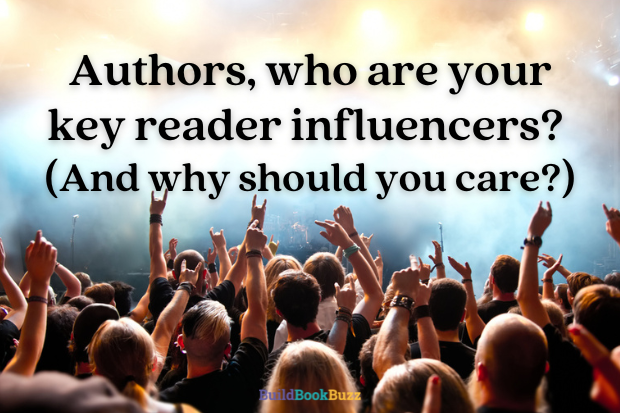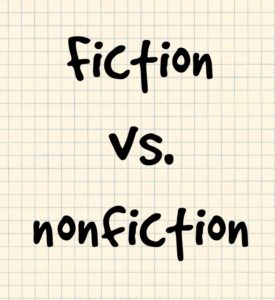Authors, who are your key reader influencers? (And why should you care?)
Key reader influencers can help you sell more books. Here's how to figure out who influences your readers and where to find them.
Who are the people who can help you sell more books?
I thought about this after an article source mentioned that his company had acquired a firm that specializes in connecting brands with “influencers” — influential social media personalities.
The companies or brands pay social media influencers to showcase their products to followers. They also advertise on influencer blogs and pay bloggers to write “sponsored” posts about the brand and its products or services, too.
There has to be transparency, of course — the FTC requires influencers to state that they’ve been paid to try and/or write about the brands.
Ethics obligate influencers to disclose their brand relationships, but so do their relationships with their followers. They know that fans count on them to provide information they can trust.
The author connection
What does this have to do with authors?
It illustrates how important key influencers are to good marketing. And good marketing is the difference between a good book that sells and a good book that doesn’t.
Plus, if the big consumer brands are connecting with their audience’s influencers in ways that help them sell more products, shouldn’t you be doing it, too?
The most important reason to identify your reader infuencers, though, is to solicit endorsements. It doesn’t cost you anything, and endorsements carry weight.
Ethics obligate influencers to be honest, but so do their relationships with their followers. They know that their fans count on them to provide information they can trust.Click to tweetReader influencers play a role with your audience
An influencer is someone who is both active online and respected and followed by your target audience.
“Key” refers to the influential people at the very top of your list. They’re the reader influencers who have the most clout and audience respect.
To find your key influencers, you have to be clear on your target audience. It’s essential that you know who is most likely to buy your book. (For more on that, read “The powerful and effective formula for more book sales.“)
When you know your target audience, you can figure out who they listen to and respect.
Fiction vs. nonfiction reader influencers
People who influence fiction readers are usually different from those who influence nonfiction readers.
Novelists, start with the most popular authors in your genre.
A historical romance author, for example, might include Diana Gabaldon and Beverly Jenkins on their list of key influencers.
A novelist’s list might also include BookTokers, BookTubers, genre bloggers, prolific genre readers, and any well-known genre publishing house editors.
Add lesser-known influencers in those categories, too. They are going to be more accessible than those at the top. (But I believe in starting at the top and working my way down.)
Nonfiction influencers are usually industry or topic experts and leaders.
A cookbook author’s target audience can be influenced by any high-profile food personalities, including TikTok chefs and popular Food Network show hosts.
Successful serial entrepreneurs and technology startup founders probably influence the audience for an entrepreneurship book.
How to find your reader influencers
The question for many authors is “How do I figure out who influences my readers?”
You might know the answer already without realizing it: Who influences you?
- If you write fiction, you’re probably influenced by certain novelists or recognize the names of up and comers. Start there.
- If you write nonfiction, who are the topic experts you’re following already?
Expand your search from there.
Tools to help you find influencers
Whether you have a list of influencers already or not, a handful of tools can help you expand your search.
Social media
Use hashtags on Instagram, TikTok, and Twitter to find people posting about what you write about. Check follower counts and engagement. Who’s the most popular?
Type what you you’re looking for into the search box; dig into the results.
LinkedIn and Facebook groups
Both social networks offer groups for a wide range of topics. Group founders, leaders, or administrators are often experts on the topic being discussed.
In addition, many group members are also influential experts.
Trade association officers and leaders
Trade and industry association officers and committee chairs — such as the board of directors of the Romance Writers of America — are usually widely respected in their fields.
Conference speakers
This is a great way to identify influencers on their way up. Study the speaker line-up for conferences you’d consider attending if you could.
Followerwonk
Follwerwonk is a multi-layered social media management tool. The free version lets you schedule content across multiple social media platforms.
But the power is in the paid version. Identify potential influencers with the profile search function, which lets you find people through bio keyword searches.
Subscribe for one month for $15 to get everything you need, then cancel. (Or, get hooked on Followerwonk’s analytics and stick around!)
What do you do with your reader influencer list?
Once you’ve created your influencer list, become known to the people on it. Get on their radar.
It’s a slow, subtle, process.
But it’s a simple and easy one:
- Follow them on social media.
- Share their content.
- Comment on their content.
When commenting, be sure to say something that adds to the conversation. There’s nothing wrong with “Nice post,” or “Good point,” but both are generic comments that won’t help you stand out.
And your goal is to stand out in a good way. When you stand out, you get noticed.
The big ask
When your key influencers know who you are, you can ask for their support.
Ask them to “blurb” your book. A blurb — testimonial or endorsement — from a key reader influencer tells readers that your book has been expert- and authority-tested and approved.
If you haven’t done this before and appreciate step-by-step instructions and templates, get my multi-media training program. “Blurbs, Endorsements, and Testimonials: How to Get Experts, Authorities, Celebrities, and Others to Endorse Your Book” has everything you need to know to reach the right people with the right message.
Alternatively, work toward the kind of word-of-mouth recommendation that can help sell books. Send your book with a personal note that suggests that their followers will be interested in it with a brief explanation of why.
If they oblige, be sure to extend the impact by resharing what they’ve posted with your followers.
Got a big marketing budget along with an audience that pays attention to social media influencers? Explore a paid relationship with a less-popular influencer who might be willing to talk up your book for a fee (and disclose that it’s a paid post, of course).
Don’t skip this step
Whether you ask anything of influencers or not, you need to be familiar with the most influential people in your niche, genre, or category. When you don’t…and that becomes clear…readers won’t have faith in your ability to meet their standards.
You can’t give readers what they expect when you’re so out of touch that you don’t know who represents the best in your genre.
You can't give readers what they expect when you're so out of touch that you don't know who represents the best in your genre.Click to tweetMake connections that are important to your career and build trust with your readers by identifying and connecting with key reader influencers. It’s easy…and it’s free.
Start thinking about your influencers today — now. Who is one of them? Tell us who it is and why in a comment below.
Editor’s note: This article was first published in February 2017. It has been updated and expanded.)
Like what you’re reading? Get it delivered to your inbox every week by subscribing to the free Build Book Buzz newsletter. You’ll also get my free “Top 5 Free Book Promotion Resources” cheat sheet immediately!



In addition to individual authors, in my fiction genre, there are prominent editors of anthologies who have a lot of credibility. Sorta meta. Their opinions carry a lot of weight.
Thanks, Vicki. Great example.
Sandy
Hi, Sandra.
The Big Thrill, an online international magazine for thriller writers, is a great place for mystery/thriller writers to identify potential influencers in the genre.
Thanks for another great post.
Gary Guinn
Great tip, Gary! Thanks!
Sandy
This was very interesting.
I hope it gave you something to think about, Barb. Thanks for the feedback!
Sandy
Sandy, another excellent piece of advice, Thanks again. Question: I’m starting an email list and I’d like to make each email more personal, like you do. How is that done? Appreciate an answer, Jim O’Brien
The marketing experts divide book categories into fiction and nonfiction. But nobody says anything about creative nonfiction, also called narrative or literary nonfiction. This, it seems to be, is between fiction and nonfiction; it covers both. In this category, the author isn’t an expert on anything; hesh is just telling a factual story in narrative fashion, inventing or embellishing characters’ unknown responses and situations that do not alter the basic facts. Do the same marketing and promotional methods apply to this category as to fiction?
Bob, if you’re asking specifically about this article topic rather than book marketing in general, yes, you can apply this to narrative nonfiction. If you can tell me more about the book you’re referring to, I can probably provide a more helpful answer.
Sandy